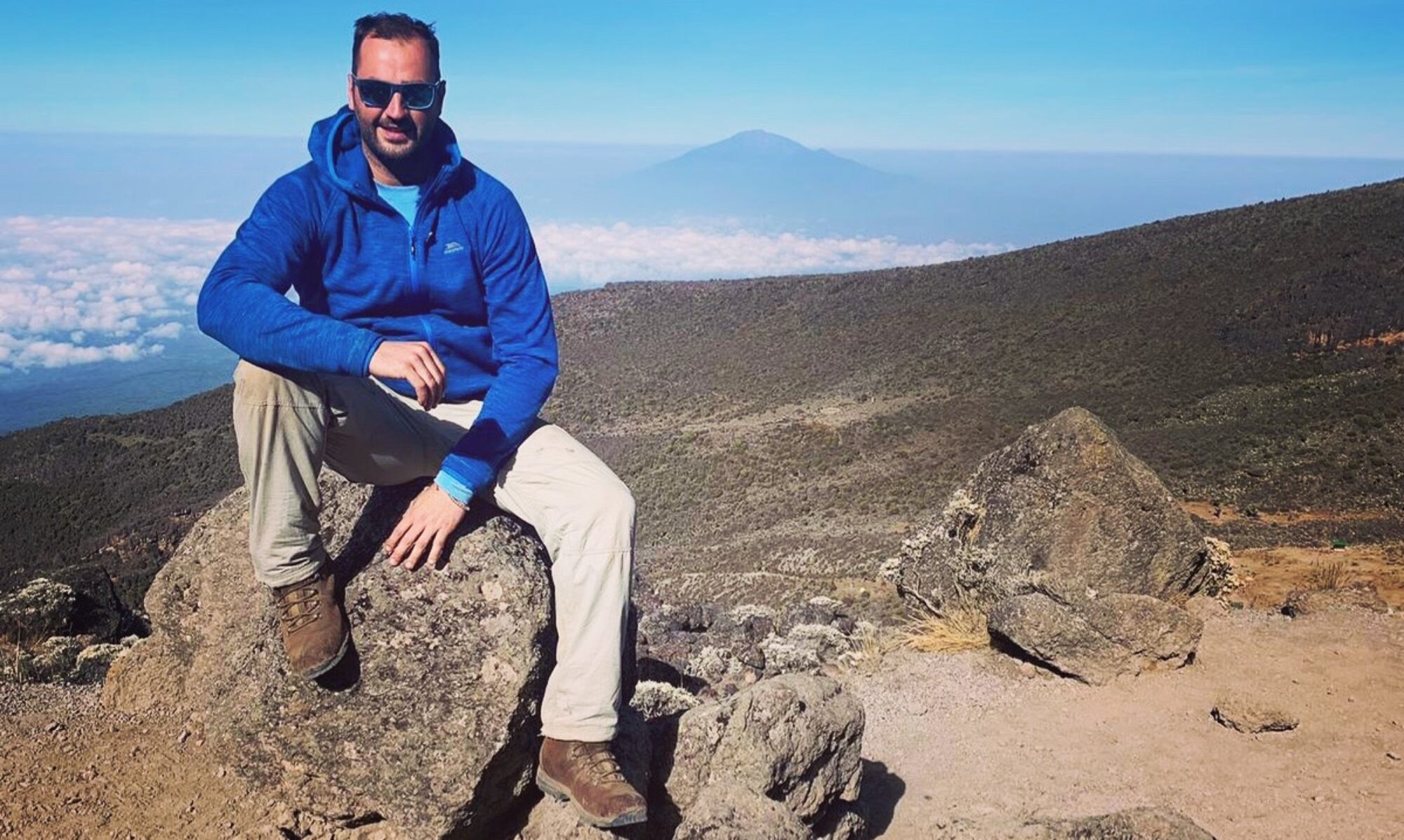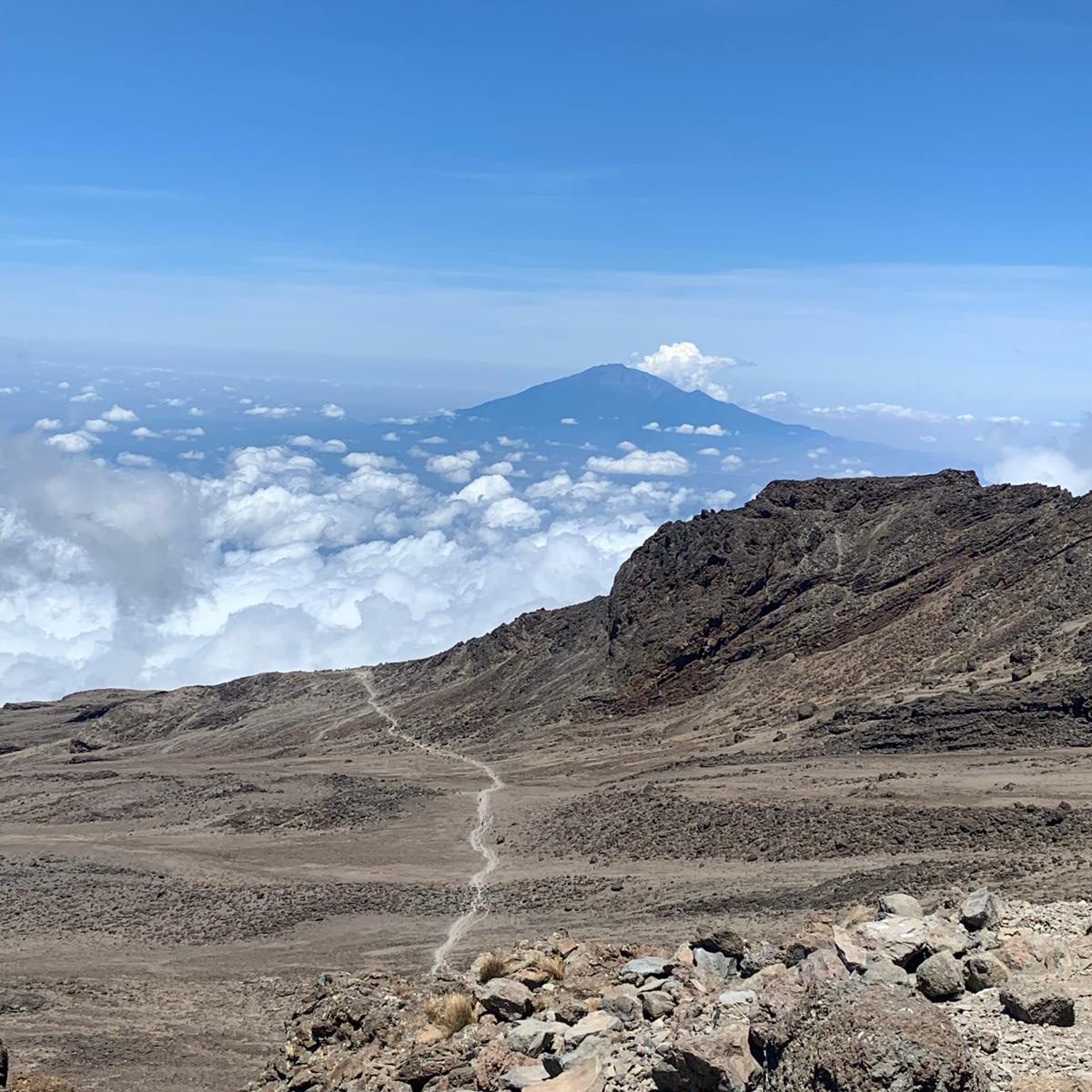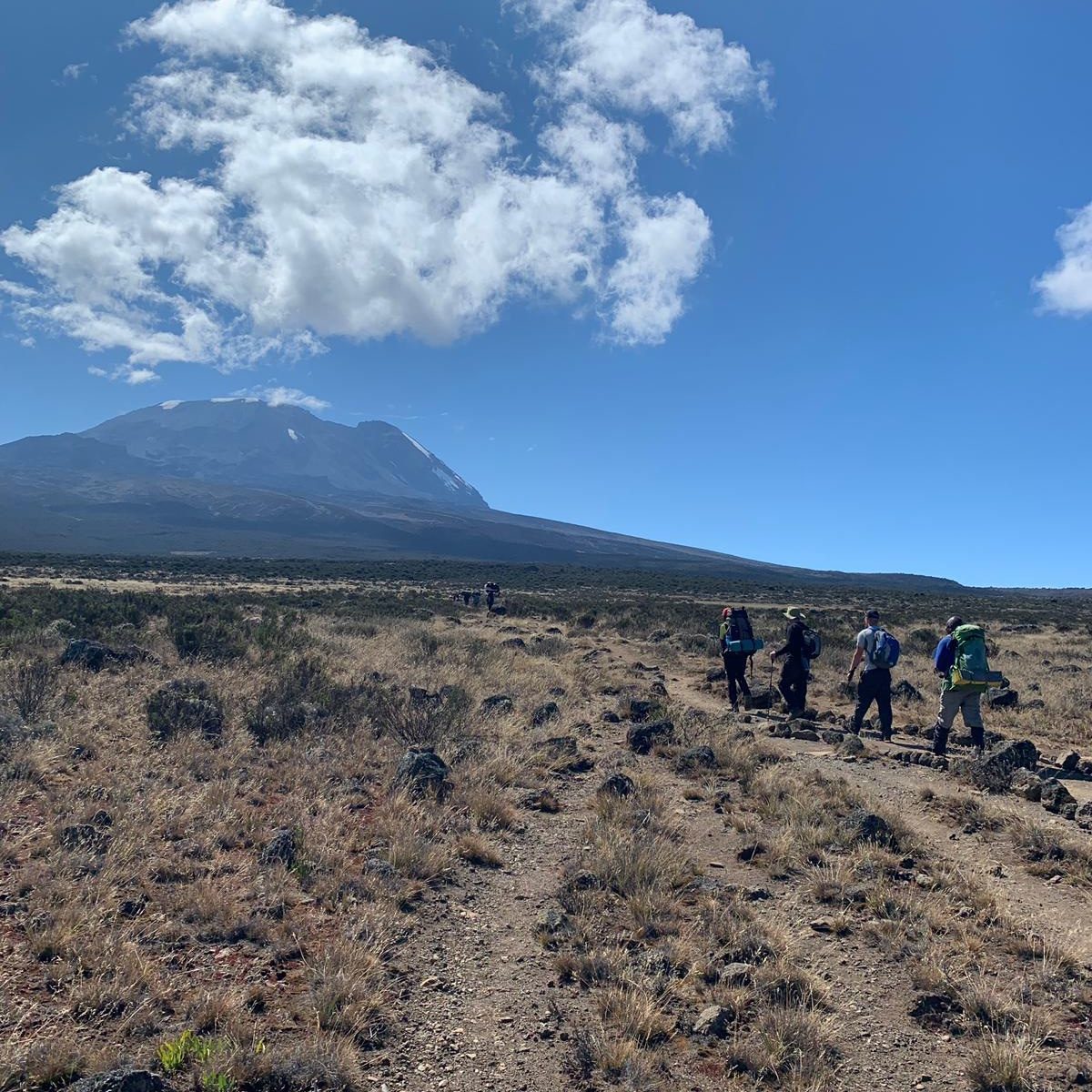So, as I finally sit down and reflect upon the achievement of climbing Mount Kilimanjaro, I’m left with a mixture of emotions. On the one hand there is the clear elation of success, of achieving something so crazily stupid that it defies belief, and thoughts of the vast sums of money raised by others for “good causes”. On the other hand, however, there is an aspect of the trip that causes severe food for thought. Was this an adventure to massage the ego, or an opportunity of an insight into a racial divide that still exists (for all the seeming progress that has been made in equality) or, worse still, was this witnessing slavery in the raw?
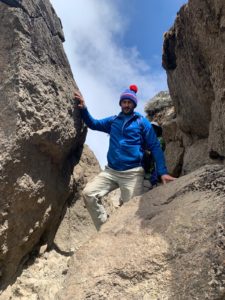
Firstly, let me thank those that supported us in raising so much money for our chosen charities. I hope and pray that the money raised can make a difference. The choices made of Cancer Research and St Margaret’s hospice didn’t have much meaning to me at the time. Perhaps it is through selfishness that I had previously ignored the world of cancer as I put up a shield of positivity to hopefully protect myself from the terrible world of pain it causes. That all changed just prior to the trip as someone very dear to me was diagnosed with the terrible disease. This trip suddenly took on a whole different meaning. It was no longer about ticking off another adventure but helping to support the efforts made by the others in raising money. Every slow and methodical plod was now being used to help raise every penny. The charitable cause now had a meaning to which I could relate. Oh, how I now wish I had been able to help more with the fundraising efforts. There are many arguments that could be made about the money raised. The kindness and generosity shown by many cannot and should not be ignored. This puzzled me on the walk and was mentioned by a minority – why does it take 3 men walking up a mountain to get people to make charitable donations?
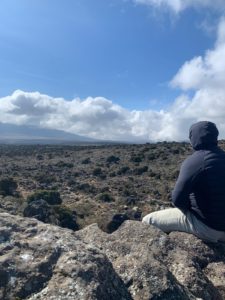
If we don’t know already, we are lucky and privileged to live in such a world as we have to enjoy. If you consider that you don’t think you are lucky then travel and see the conditions that some people endure in order to survive. Had we not paid to climb up the mountain and instead put all that money to charity, we know the amount raised would been vastly increased. Is it not true of all of us that doing things for charity enables us to handle our guilty consciences? We only have to look at the greed and ignorance of this world and the people in it. Unfortunately, and disappointingly, this was highlighted by bad news shared with us from back home before we left. Members of the local hospice that we were sponsoring were appearing in court on fraud charges. Some were found guilty. What a tragic state of affairs and hardly the motivation needed for what amounted to a slog up a mountain. No man is an island and many others were affected and badly so by dreadful behaviour. Every step climbed and every penny raised was now for a cause close to my heart, and in the time of struggles, of which there were plenty, there was a stark reminder of the need to keep on going and ensure the summit was reached. I will say that I hope all money associated with this trip goes to its intended destinations, and that I can sleep easy. In conclusion, even the good feeling experienced by raising the money has been accompanied by other not-so-good feelings.
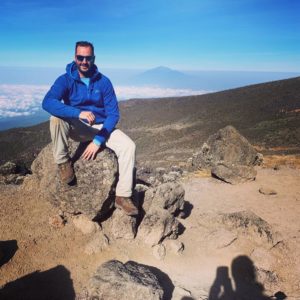
Secondly, we shouldn’t ignore the fact that we climbed to summit of Mount Uhuru, the tallest free-standing mountain in the world at 5895m. To put that into context, it’s almost 2000ft higher than Everest base camp, it’s 7 times taller than the highest man-made structure in the world ((Burj Khalifa – 2717ft)), or if you were to place the tallest 16 buildings in America on top of each other the resulting structure wouldn’t be as high as the mountain. For those who live in the UK it’s over 5 times the height of Mt Snowdon. Our voyage to the summit of Mt Kilimanjaro was on the Lemosho route (8 days), the longest possible route to the summit of the mountain. Our guide was brilliant and provided us with so much knowledge along the way. He informed me that we weren’t even climbing Mt Kilimanjaro. The shock and surprise must have made for a priceless photo. He informed us that the mount was called Mt Kebo, which is one of 3 peaks in the Kilimanjaro park, the other two being Mt Mawenzi and Mt Meru. Mt Mawenzi (5149m) is unclimbable, Mt Meru (4565m) is climbed by some prior to climbing Mt Kebo (5895m). All the false advertisements and statements of achievement washed away by a moment of truth. We climbed Mt Kebo!!! Eventually the assimilation of all this info put a smile on my face. That said this was an accomplishment, when it is realised that we are only a century on from the first climb to the summit of the tallest freestanding mountain, and that since then only half of all the people that have attempted the climb have made it to the top. We were lucky enough to make it and to see the glacier on top which has shrunk 82% from its original size and that scientists believe will not be there in 50 years’ time. What we mustn’t forget is that the mountain is a sign of freedom for the people of Tanzania. In 1962 they escaped British and European rule and became their own country. The mountain therefore is called Mountain of Hope, and respect should be shown to it and its people. This concludes arguments for all that is good – now the arguments for the bad.
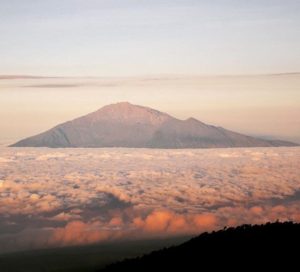
When Heins Mehr first climbed Mt Kebo in 1889 who would have known that so many would have followed in his footsteps (I’m still trying to work out what the appeal is, I can’t even recall what the appeal to me was). We were just like Hans, he was someone from the modern/western world accompanied by “local” guides (not much has changed). Whilst our success could be put down to ourselves (it is necessary to get out of bed in the morning), we can’t ignore the locals, who joined and supported our team (perhaps in the same way that similar people did for Hans) and had to suffer to ensure our comforts and luxuries were catered for. Surely part of the appeal of this trip was to escape the real world and not to live in luxury and be waited on hand and foot. I will admit to thinking a donkey was going to be used to support us up the mountain (stupid I know). Instead we had humans who were perhaps treated like donkeys. They joined in the gruelling climb up the mountain but also carried all our stuff. I was appalled at the sight of these poor men working so hard to satisfy my ego, in threadbare clothes and worn-out shoes (possibly handed down). This was recycling in its most necessary form and I felt a little sad in all the gear, fresh and new, and these guys struggling in barely nothing. Anyone who thinks they know what hard work is, can think again. This was surely the hardest of hard work that I had ever witnessed. I sat there as a fit man appalled at what I was seeing. I dread to think what they were paid, if at all. Slavery in its most camouflaged form?? Comparisons could be made to the debate about the zero-hour contracts and minimum wages being debated in connection with the general election back home, but this smacked of less than minimum wages and it’s no wonder these people are desperate to reach British shores. They clearly weren’t financially rewarded in the way they should have been. We had paid so much money to be there, but I doubt they saw even a tiny percentage of what we paid. Corruption?? From where I sat it seemed that way. We had a tip for them, which sadly couldn’t be given to them in person. It which went via the hotel manager, would they receive it? I hope and pray that they did.
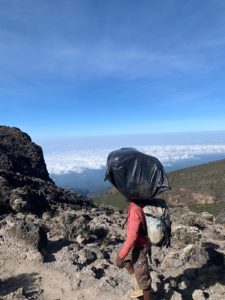
In my opening remarks I pointedly referred to a racial divide. This was evident at every moment and in everything that happened on our trip. This was perhaps a confirmation of what is witnessed during travel but seemed ever so much more apparent here. From comments like, “white guy lets go” said in Swahili to noticing that all the support staff were black and all the people climbing the mountain were white. The black people worked very hard and almost seemed to beg for the white people’s money. The white people were for the most part and for most of the time blissfully unaware of the different world they were trekking in. Yes, it’s a way of surviving and making an income that probably isn’t afforded to them in another way but surely there must better ways to support these guys financially rather than dragging them up a mountain carrying us as they did so. I refer to the porters probably not being paid very much (I have no evidence apart from what could be seen with my eyes and I concede that things are not always as they appear), which prompted my comments about slavery. This whole feeling was perhaps the worst part of the whole trip in my eyes. It was an increasingly disappointing aspect of the trip. I know that our very presence there brings untold wealth to the area, an area that without the money brought in would be plagued by disease and poverty. There is a fine line between what is right and wrong; I cannot say on which side of the line we fell in our presence there.
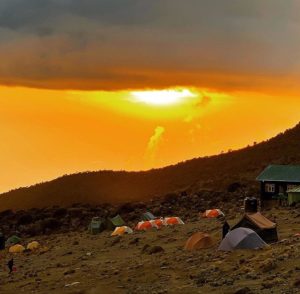
So, as I conclude this blog, it’s with sadness in my heart that this trip has left me with so many mixed emotions. Achievements and success will remain forever, as friendships grew stronger and new ones were made, but deep down there is an underlying fear of the guilt and pain caused to so many. I certainly will think twice of such a trip again. There must be different ways by which I can raise money here. There must be better ways of improving these people’s lives. Lessons, many of them painful, have been learned. I have witnessed many things and experiences have been shared. If you’re thinking of completing the hike up Kilimanjaro then think twice and consider not only your sense of achievement, your health in both body and mind, and the wealth you bring to the place but the impact that your actions will have.
